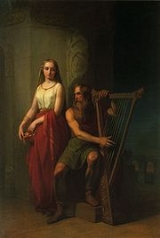
Bragi
Encyclopedia
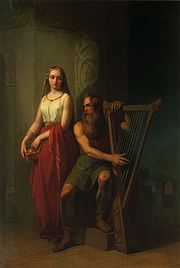
Skald
The skald was a member of a group of poets, whose courtly poetry is associated with the courts of Scandinavian and Icelandic leaders during the Viking Age, who composed and performed renditions of aspects of what we now characterise as Old Norse poetry .The most prevalent metre of skaldic poetry is...
ic god of poetry
Poetry
Poetry is a form of literary art in which language is used for its aesthetic and evocative qualities in addition to, or in lieu of, its apparent meaning...
in Norse mythology
Norse mythology
Norse mythology, a subset of Germanic mythology, is the overall term for the myths, legends and beliefs about supernatural beings of Norse pagans. It flourished prior to the Christianization of Scandinavia, during the Early Middle Ages, and passed into Nordic folklore, with some aspects surviving...
.
Etymology
Bragi is generally associated with bragr, the Norse word for poetryPoetry
Poetry is a form of literary art in which language is used for its aesthetic and evocative qualities in addition to, or in lieu of, its apparent meaning...
. The name of the god may have been derived from bragr, or the term bragr may have been formed to describe 'what Bragi does'. A connection between the name Bragi and English brego 'chieftain' has been suggested but is generally now discounted. A connection between Bragi and the bragarfull 'promise cup' is sometimes suggested, as bragafull, an alternate form of the word, might be translated as 'Bragi's cup'. See Bragarfull.
Attestations
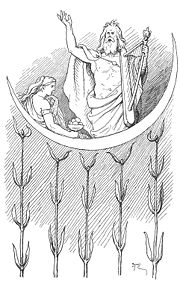
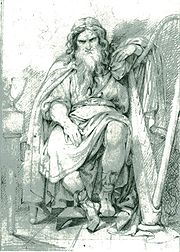
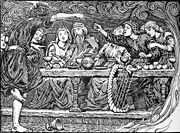
Snorri Sturluson
Snorri Sturluson was an Icelandic historian, poet, and politician. He was twice elected lawspeaker at the Icelandic parliament, the Althing...
writes in the Gylfaginning
Gylfaginning
Gylfaginning, or the Tricking of Gylfi , is the first part of Snorri Sturluson's Prose Edda after Prologue. The Gylfaginning deals with the creation and destruction of the world of the Norse gods, and many other aspects of Norse mythology...
after describing Odin
Odin
Odin is a major god in Norse mythology and the ruler of Asgard. Homologous with the Anglo-Saxon "Wōden" and the Old High German "Wotan", the name is descended from Proto-Germanic "*Wodanaz" or "*Wōđanaz"....
, Thor
Thor
In Norse mythology, Thor is a hammer-wielding god associated with thunder, lightning, storms, oak trees, strength, the protection of mankind, and also hallowing, healing, and fertility...
, and Baldr:
In Skáldskaparmál
Skáldskaparmál
The second part of Snorri Sturluson's Prose Edda the Skáldskaparmál or "language of poetry" is effectively a dialogue between the Norse god of the sea, Ægir and Bragi, the god of poetry, in which both Norse mythology and discourse on the nature of poetry are intertwined...
Snorri writes:
That Bragi is Odin's son is clearly mentioned only here and in some versions of a list of the sons of Odin (see Sons of Odin
Sons of Odin
Various gods and men appear as Sons of Odin or Sons of Wodan/Wotan or Sons of Woden in old Old Norse and Old High German and Old English texts.-Thor, Baldur, and Váli:...
). But "wish-son" in stanza 16 of the Lokasenna
Lokasenna
Lokasenna is one of the poems of the Poetic Edda. The poem presents flyting between the gods and Loki....
could mean "Odin's son" and is translated by Hollander as Odin's kin. Bragi's mother is never named. If Bragi's mother is Frigg
Frigg
Frigg is a major goddess in Norse paganism, a subset of Germanic paganism. She is said to be the wife of Odin, and is the "foremost among the goddesses" and the queen of Asgard. Frigg appears primarily in Norse mythological stories as a wife and a mother. She is also described as having the power...
, then Frigg is somewhat dismissive of Bragi in the Lokasenna in stanza 27 when Frigg complains that if she had a son in Ægir
Ægir
Ægir is a sea giant, god of the ocean and king of the sea creatures in Norse mythology. He is also known for hosting elaborate parties for the gods.Ægir's servants are Fimafeng and Eldir.- Description :...
's hall as brave as Baldr then Loki
Loki
In Norse mythology, Loki or Loke is a god or jötunn . Loki is the son of Fárbauti and Laufey, and the brother of Helblindi and Býleistr. By the jötunn Angrboða, Loki is the father of Hel, the wolf Fenrir, and the world serpent Jörmungandr. By his wife Sigyn, Loki is the father of Nari or Narfi...
would have to fight for his life.
In that poem Bragi at first forbids Loki to enter the hall but is overruled by Odin. Loki then gives a greeting to all gods and goddesses who are in the hall save to Bragi. Bragi generously offers his sword, horse, and an arm ring as peace gift but Loki only responds by accusing Bragi of cowardice, of being the most afraid to fight of any of the Æsir
Æsir
In Old Norse, áss is the term denoting a member of the principal pantheon in Norse paganism. This pantheon includes Odin, Frigg, Thor, Baldr and Tyr. The second pantheon comprises the Vanir...
and Elves within the hall. Bragi responds that if they were outside the hall, he would have Loki's head, but Loki only repeats the accusation. When Bragi's wife Iðunn attempts to calm Bragi, Loki accuses her of embracing her brother's slayer, a reference to matters that have not survived. It may be that Bragi had slain Iðunn's brother.
A passage in the Poetic Edda poem Sigrdrífumál
Sigrdrífumál
Sigrdrífumál is the conventional title given to a section of the Poetic Edda text in Codex Regius....
describes runes being graven on the sun, on the ear of one of the sun-horses and on the hoofs of the other, on Sleipnir
Sleipnir
In Norse mythology, Sleipnir is an eight-legged horse. Sleipnir is attested in the Poetic Edda, compiled in the 13th century from earlier traditional sources, and the Prose Edda, written in the 13th century by Snorri Sturluson...
's teeth, on bear's paw, on eagle's beak, on wolf's claw, and on several other things including on Bragi's tongue. Then the runes are shaved off and the shavings are mixed with mead and sent abroad so that Æsir have some, Elves have some, Vanir
Vanir
In Norse mythology, the Vanir are a group of gods associated with fertility, wisdom and the ability to see the future. The Vanir are one of two groups of gods and are the namesake of the location Vanaheimr . After the Æsir–Vanir War, the Vanir became a subgroup of the Æsir...
have some, and Men have some, these being beech runes and birth runes, ale runes, and magic runes. The meaning of this is obscure.
The first part of Snorri Sturluson's Skáldskaparmál
Skáldskaparmál
The second part of Snorri Sturluson's Prose Edda the Skáldskaparmál or "language of poetry" is effectively a dialogue between the Norse god of the sea, Ægir and Bragi, the god of poetry, in which both Norse mythology and discourse on the nature of poetry are intertwined...
is a dialogue between Ægir
Ægir
Ægir is a sea giant, god of the ocean and king of the sea creatures in Norse mythology. He is also known for hosting elaborate parties for the gods.Ægir's servants are Fimafeng and Eldir.- Description :...
and Bragi about the nature of poetry, particularly skaldic poetry. Bragi tells the origin of the mead of poetry from the blood of Kvasir
Kvasir
In Norse mythology, Kvasir was a being born of the saliva of the Æsir and the Vanir, two groups of gods. Extremely wise, Kvasir traveled far and wide, teaching and spreading knowledge. This continued until the dwarfs Fjalar and Galar killed Kvasir and drained him of his blood...
and how Odin obtained this mead. He then goes on to discuss various poetic metaphors known as kenning
Kenning
A kenning is a type of literary trope, specifically circumlocution, in the form of a compound that employs figurative language in place of a more concrete single-word noun. Kennings are strongly associated with Old Norse and later Icelandic and Anglo-Saxon poetry...
s.
Snorri Sturluson clearly distinguishes the god Bragi from the mortal skald Bragi Boddason whom he often mentions separately. Bragi Boddason is discussed below. The appearance of Bragi in the Lokasenna indicates that if these two Bragis were originally the same, they have become separated for that author also, or that chronology has become very muddled and Bragi Boddason has been relocated to mythological time. Compare the appearance of the Welsh
Wales
Wales is a country that is part of the United Kingdom and the island of Great Britain, bordered by England to its east and the Atlantic Ocean and Irish Sea to its west. It has a population of three million, and a total area of 20,779 km²...
Taliesin
Taliesin
Taliesin was an early British poet of the post-Roman period whose work has possibly survived in a Middle Welsh manuscript, the Book of Taliesin...
in the second branch of the Mabinogi
Mabinogion
The Mabinogion is the title given to a collection of eleven prose stories collated from medieval Welsh manuscripts. The tales draw on pre-Christian Celtic mythology, international folktale motifs, and early medieval historical traditions...
. Legendary chronology sometimes does become muddled. Whether Bragi the god originally arose as a deified version of Bragi Boddason was much debated in the 19th century, especially by the German
Germany
Germany , officially the Federal Republic of Germany , is a federal parliamentary republic in Europe. The country consists of 16 states while the capital and largest city is Berlin. Germany covers an area of 357,021 km2 and has a largely temperate seasonal climate...
scholars Eugen Mogk and Sophus Bugge. The debate remains undecided.
In the poem Eiríksmál
Eiríksmál
Eiríksmál is a skaldic poem composed sometime in 954 or later on the behest of the Norwegian queen Gunnhild in honour of her slain consort Erik Bloodaxe. Only the beginning of the poem is extant....
Odin, in Valhalla
Valhalla
In Norse mythology, Valhalla is a majestic, enormous hall located in Asgard, ruled over by the god Odin. Chosen by Odin, half of those that die in combat travel to Valhalla upon death, led by valkyries, while the other half go to the goddess Freyja's field Fólkvangr...
, hears the coming of the dead Norwegian
Norway
Norway , officially the Kingdom of Norway, is a Nordic unitary constitutional monarchy whose territory comprises the western portion of the Scandinavian Peninsula, Jan Mayen, and the Arctic archipelago of Svalbard and Bouvet Island. Norway has a total area of and a population of about 4.9 million...
king Eric Bloodaxe
Eric Bloodaxe
Eric Haraldsson , nicknamed ‘Bloodaxe’ , was a 10th-century Scandinavian ruler. He is thought to have had short-lived terms as the second king of Norway and possibly as the last independent ruler of the kingdom of Northumbria Eric Haraldsson (Eric, anglicised form of ; died 954), nicknamed...
and his host, and bids the heroes Sigmund
Sigmund
This article is about the mythological hero Sigmund; for other meanings see: Sigmund .In Norse mythology, Sigmund is a hero whose story is told in the Völsunga saga. He and his sister, Signý, are the children of Völsung and his wife Hljod...
and Sinfjötli
Sinfjötli
Sinfjötli or Fitela in Norse mythology was born out of the incestuous relationship between Sigmund and his sister Signy...
rise to greet him. Bragi is then mentioned, questioning how Odin knows that it is Eric and why Odin has let such a king die. In the poem Hákonarmál
Hákonarmál
Hákonarmál is a skaldic poem which the skald Eyvindr skáldaspillir composed about the fall of the Norwegian king Hákon the Good at the battle of Fitjar and his reception in Valhalla. This poem emulates Eiríksmál and is intended to depict the Christian Hákon as a friend to the pagan gods...
, Hákon the Good is taken to Valhalla by the valkyrie
Valkyrie
In Norse mythology, a valkyrie is one of a host of female figures who decides who dies in battle. Selecting among half of those who die in battle , the valkyries bring their chosen to the afterlife hall of the slain, Valhalla, ruled over by the god Odin...
Göndul
Göndul
In Norse mythology, Göndul is a valkyrie. Göndul is attested in Heimskringla, Sörla þáttr, and a 14th century Norwegian charm...
and Odin sends Hermóðr
Hermóðr
Hermóðr the Brave is a figure in Norse mythology, the son of god Odin.-Prose Edda:Hermóðr appears distinctly in section 49 of the Prose Edda book Gylfaginning. There, it is described that the gods were speechless and devastated at the death of Baldr, unable to react due to their grief...
and Bragi to greet him. In these poems Bragi could be either a god or a dead hero in Valhalla. Attempting to decide is further confused because Hermóðr also seems to be sometimes the name of a god and sometimes the name of a hero. That Bragi was also the first to speak to Loki in the Lokasenna as Loki attempted to enter the hall might be a parallel. It might have been useful and customary that a man of great eloquence and versed in poetry should greet those entering a hall.
Bragi Boddason
In the Prose Edda Snorri Sturluson quotes many stanzas attributed to Bragi Boddason the old (Bragi Boddason inn gamli), a court poet who served several Swedish kings, Ragnar LodbrokRagnar Lodbrok
Ragnar Lodbrok was a Norse legendary hero from the Viking Age who was thoroughly reshaped in Old Norse poetry and legendary sagas.-Life as recorded in the sagas:...
, Östen Beli and Björn at Hauge who reigned in the first half of the 9th century. This Bragi was reckoned as the first skaldic poet, and was certainly the earliest skaldic poet then remembered by name whose verse survived in memory.
Snorri especially quotes passages from Bragi's Ragnarsdrápa
Ragnarsdrápa
Ragnarsdrápa is a skaldic poem composed in honour of the Scandinavian hero Ragnar Lodbrok. It is attributed to the oldest known skald Bragi Boddason who lived in the 9th century, and composed for the Swedish king Björn at Haugi. Bragi describes the images on a decorated shield which Ragnar had...
, a poem supposedly composed in honor of the famous legendary Viking Ragnar Lodbrók
Ragnar Lodbrok
Ragnar Lodbrok was a Norse legendary hero from the Viking Age who was thoroughly reshaped in Old Norse poetry and legendary sagas.-Life as recorded in the sagas:...
('Hairy-breeches') describing the images on a decorated shield which Ragnar had given to Bragi. The images included Thor's fishing for Jörmungandr
Jörmungandr
In Norse mythology, Jörmungandr , mostly known as Jormungand, orJörmungand , or Midgard Serpent , or World Serpent, is a sea serpent, and the middle child of the giantess Angrboða and the god Loki...
, Gefjun's ploughing of Zealand from the soil of Sweden, the attack of Hamdir and Sorli against King Jörmunrekk
Ermanaric
Ermanaric was a Greuthungian Gothic King who before the Hunnic invasion evidently ruled an enormous area north of the Black Sea. Contemporary historian Ammianus Marcellinus recounts him as a "most warlike man" who "ruled over extensively wide and fertile regions"...
, and the never-ending battle between Hedin and Högni
Hedin and Högni
Hjaðningavíg , the legend of Heðinn and Hǫgni or the Saga of Hild is a Scandinavian legend from Norse mythology about a never-ending battle which is documented in Sörla þáttr, Ragnarsdrápa, Gesta Danorum, Skíðaríma and in Skáldskaparmál. It is also held to appear on the image stone at Stora Hammar...
.
Bragi son of Hálfdan the Old
Bragi son of Hálfdan the Old is mentioned only in the Skjáldskaparmál. This Bragi is the sixth of the second of two groups of nine sons fathered by King Hálfdan the Old on Alvig the Wise, daughter of King Eymund of Hólmgard. This second group of sons are all eponymous ancestors of legendary families of the north. Snorri says:
Bragi, from whom the Bragnings are sprung (that is the race of Hálfdan the Generous).
Of the Bragnings as a race and of Hálfdan the Generous nothing else is known. However, Bragning is often, like some others of these dynastic names, used in poetry as a general word for 'king' or 'ruler'.
Bragi Högnason
In the eddic poem Helgakviða Hundingsbana IIHelgakviða Hundingsbana II
Völsungakviða in forna, Helgakviða Hundingsbana II or the Second Lay of Helgi Hundingsbane is an Old Norse poem found in the Poetic Edda...
, Bragi Högnason, his brother Dag, and his sister Sigrún were children of Högne
Högne
For other people named Högne, see Haguna.Högne was a king of Östergötland who appears in sources Norse mythology.-Heimskringla:Snorri Sturluson wrote that he was the king of Östergötland and that he had a son named Hildur and daughter Hilda who was married to Granmar, the king of Södermanland...
, the king of East Götaland. The poem relates how Sigmund
Sigmund
This article is about the mythological hero Sigmund; for other meanings see: Sigmund .In Norse mythology, Sigmund is a hero whose story is told in the Völsunga saga. He and his sister, Signý, are the children of Völsung and his wife Hljod...
's son Helgi Hundingsbane
Helgi Hundingsbane
Helgi Hundingsbane is a hero in Norse sagas. Helgi appears in Volsunga saga and in two lays in the Poetic Edda named Helgakviða Hundingsbana I and Helgakviða Hundingsbana II. The Poetic Edda relates that Helgi and his mistress Sigrún were Helgi Hjörvarðsson and Sváva of the Helgakviða...
agreed to take Sigrún daughter of Högni as his wife against her unwilling betrothal to Hodbrodd son of Granmar
Granmar
Granmar was a king of Södermanland, in Snorri Sturluson's Heimskringla. The same king also appears in the Volsunga saga.Granmar was married to Hilda, the daughter of the Geatish king Högne of East Götaland, and his son-in-law was the seaking Hjörvard of the Ylfings...
the king of Södermanland
Södermanland
', sometimes referred to under its Latin form Sudermannia or Sudermania, is a historical province or landskap on the south eastern coast of Sweden. It borders Östergötland, Närke, Västmanland and Uppland. It is also bounded by lake Mälaren and the Baltic sea.In Swedish, the province name is...
. In the subsequent battle of Frekastein (probably one of the 300 hill fort
Hill fort
A hill fort is a type of earthworks used as a fortified refuge or defended settlement, located to exploit a rise in elevation for defensive advantage. They are typically European and of the Bronze and Iron Ages. Some were used in the post-Roman period...
s of Södermanland, as stein meant "hill fort") against Högni and Grammar, all the chieftains on Granmar's side are slain, including Bragi, except for Bragi's brother Dag.

